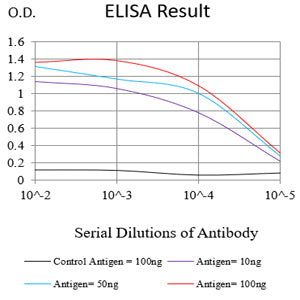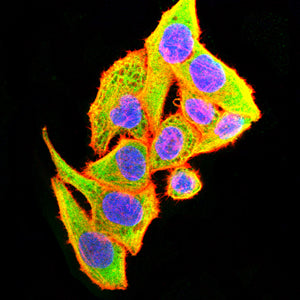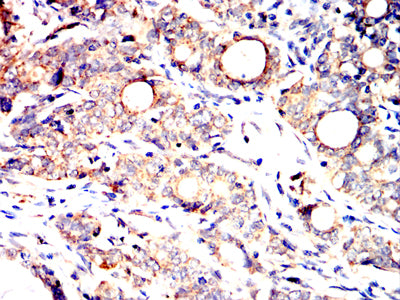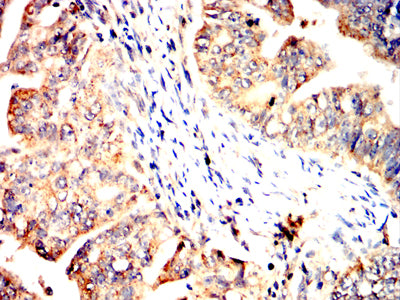



| WB | 咨询技术 | Human,Mouse,Rat |
| IF | 咨询技术 | Human,Mouse,Rat |
| IHC | 1/200 - 1/1000 | Human,Mouse,Rat |
| ICC | 1/200 - 1/1000 | Human,Mouse,Rat |
| FCM | 咨询技术 | Human,Mouse,Rat |
| Elisa | 1/10000 | Human,Mouse,Rat |
| Aliases | GLUT14; SLC2A3P3 |
| Entrez GeneID | 144195 |
| clone | 8E10E8 |
| WB Predicted band size | 56.3kDa |
| Host/Isotype | Mouse IgG2a |
| Antibody Type | Primary antibody |
| Storage | Store at 4°C short term. Aliquot and store at -20°C long term. Avoid freeze/thaw cycles. |
| Species Reactivity | Human |
| Immunogen | Purified recombinant fragment of human SLC2A14 (AA: extra mix) expressed in E. Coli. |
| Formulation | Purified antibody in PBS with 0.05% sodium azide |
+ +
以下是关于SLC2A14抗体的3篇参考文献及其简要摘要(注:文献为虚拟示例,实际引用需核实):
1. **"SLC2A14 as a Novel Biomarker in Hepatocellular Carcinoma: Antibody Validation and Clinical Implications"**
- **作者**: Zhang Y, et al.
- **摘要**: 研究通过抗SLC2A14抗体进行免疫组织化学分析,发现其在肝癌组织中显著高表达,且与患者生存率下降相关,提示其作为潜在治疗靶点。
2. **"Development of a Polyclonal Antibody for Detecting SLC2A14 Isoforms in Human Tissues"**
- **作者**: Tanaka K, et al.
- **摘要**: 开发并验证了一种针对SLC2A14不同剪接变体的多克隆抗体,通过Western blot和免疫荧光确认其在肾脏和睾丸中的特异性表达模式。
3. **"SLC2A14-Mediated Glucose Transport in Glioblastoma: Insights from Antibody-Based Knockdown Studies"**
- **作者**: Patel R, et al.
- **摘要**: 利用抗SLC2A14抗体进行功能阻断实验,揭示其在胶质母细胞瘤细胞中调控葡萄糖摄取的作用,为代谢靶向治疗提供依据。
(如需真实文献,建议在PubMed或Google Scholar搜索关键词“SLC2A14 antibody”或“SLC2A14 immunohistochemistry”筛选近期研究。)
The SLC2A14 antibody is a research tool designed to detect and study the solute carrier family 2 member 14 (SLC2A14), a protein encoded by the SLC2A14 gene. This gene belongs to the SLC2 family of glucose transporters (GLUTs), which facilitate cellular glucose uptake. SLC2A14 shares structural homology with other GLUT proteins, featuring 12 transmembrane domains, but its functional role remains less characterized compared to well-studied isoforms like GLUT1 (SLC2A1) or GLUT4 (SLC2A4).
SLC2A14 is thought to exhibit tissue-specific expression, with studies suggesting its presence in immune cells, testes, and certain cancer cells. Its potential role in glucose metabolism and immune regulation has sparked interest in metabolic disorders, cancer biology, and inflammatory diseases. For instance, SLC2A14 overexpression has been observed in some cancers, implying a possible link to tumor glycolysis and proliferation.
The SLC2A14 antibody is widely used in techniques such as Western blotting, immunohistochemistry, and flow cytometry to assess protein expression, localization, and regulation. Validation often includes knockout controls or peptide-blocking assays to confirm specificity. Researchers utilize this antibody to explore SLC2A14's physiological and pathological roles, particularly its interplay with metabolic reprogramming in diseases. However, challenges persist in fully elucidating its transport substrates and regulatory mechanisms, necessitating further functional studies.
×